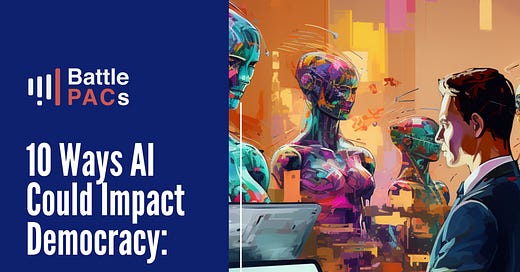Artificial intelligence (AI) has the potential to significantly influence democratic processes and reshape societies. But understanding its impact can be challenging. In this blog post, we'll break down 10 key ways AI could potentially affect democracy in the future. We explain both the risks and the possible ways AI can potentially improve democratic practices. We hope this prompts you to think about where you stand on this issue and share your views.
10 Ways AI Could Affect Democracy
1. AI and Elections
AI-powered techniques, like deepfakes and targeted misinformation, can manipulate elections and sway public opinion. These tactics pose a potential threat to the integrity of democratic processes as our laws and technology are not prepared to deal with. However, many of the solutions proposed to this misinformation problem raise concerns about the infringement of first amendment rights to freedom of expression. It also raises the difficult issue of who gets to decide on what is misinformation and what is “The Truth.” Finding a balance will be a challenge moving forward.
2. AI in Political Campaigns
AI algorithms can analyze vast amounts of data, helping political campaigns target voters with personalized messages. While this can enhance outreach, concerns arise regarding privacy, algorithmic bias, and the potential for manipulation.
3. Automated Decision-Making in Government
AI systems can automate decision-making in public services, improving efficiency and targeting of outcomes. However, the lack of transparency and accountability in these systems raises concerns about biases, unfair outcomes, and the diminishing role of human decision-making.
4. AI and Surveillance
The rise of AI-powered surveillance technologies may enable governments to monitor and track individuals better, raising valid concerns about privacy and civil liberties. Striking a balance between security measures and democratic rights is crucial.
5. Bias and Discrimination in AI
AI algorithms can perpetuate biases and discriminatory practices present in training data, leading to unfair outcomes and exacerbating societal inequalities. Addressing algorithmic bias is crucial to ensure fairness in democratic processes.
6. AI in Citizen Engagement
AI tools can facilitate citizen engagement and participatory decision-making processes, fostering inclusive deliberation. By gathering diverse perspectives and promoting dialogue, AI can enhance democratic practices.
7. Transparency and Explainability in AI
Ensuring transparency and explainability in AI systems is essential for maintaining trust and accountability in democratic processes. Citizens should have access to information about how AI algorithms make decisions.
8. AI in Civic Education
AI can enhance civic education by providing accurate information, fact-checking, and combating misinformation. AI-powered tools can empower citizens with reliable knowledge, supporting democratic societies. However, this raises concerns around censorship of dissenting viewpoints and the use of AI to further state propaganda.
9. AI and Ethical Policy-Making
AI technologies can assist policymakers in analyzing data and generating insights for evidence-based decision-making. Ensuring that policy decisions consider ethical and social implications is vital for maintaining democratic legitimacy.
10. Ethical Governance of AI
Establishing ethical frameworks and regulations to govern the development and deployment of AI is crucial for safeguarding democratic values. Robust governance can address risks associated with AI, promote transparency, and ensure accountability in its use within democratic societies.
Conclusion
AI's impact on democracy is potentially very significant, but it's essential to understand both the risks and opportunities it presents. By addressing concerns such as election manipulation, bias, and surveillance, while leveraging AI for citizen engagement, transparency, and ethical governance, we can navigate the complexities of AI's impact on democratic processes. Striking the right balance will be key as we shape the future of democracy in the age of AI.
What do you think?
Is AI a Threat to Democracy?
Have Your Say, Secure Your Future
The Voices of America Scholarship is now inviting submissions on 10 prompts. Just answer 3 prompts to have a chance of winning a share of the scholarship funds. See our social media channels below or this blog for more information on the questions and how to win.
(Remember to quote the question at the start so people know the context by saying, "this is my BattlePACs submission for the prompt of …")
Social Platforms Accepted: Instagram or TikTok
Hashtags: #BattlePACs #BattlePACsScholarship
Tag: IG - @battlepacsofficial or TikTok - @battlepacs
Follow: BattlePACs socials below






